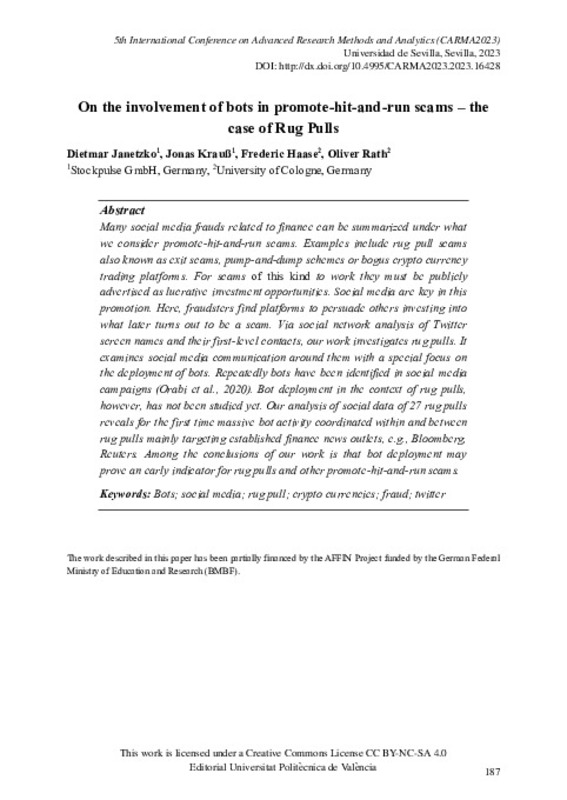JavaScript is disabled for your browser. Some features of this site may not work without it.
Buscar en RiuNet
Listar
Mi cuenta
Estadísticas
Ayuda RiuNet
Admin. UPV
On the Involvement of Bots in Promote-Hit-and-Run Scams – The Case of Rug Pulls
Mostrar el registro sencillo del ítem
Ficheros en el ítem
| dc.contributor.author | Janetzko, Dietmar
|
es_ES |
| dc.contributor.author | Krauß, Jonas
|
es_ES |
| dc.contributor.author | Haase, Frederic
|
es_ES |
| dc.contributor.author | Rath, Oliver
|
es_ES |
| dc.date.accessioned | 2024-01-10T13:40:26Z | |
| dc.date.available | 2024-01-10T13:40:26Z | |
| dc.date.issued | 2023-09-22 | |
| dc.identifier.isbn | 9788413960869 | |
| dc.identifier.uri | http://hdl.handle.net/10251/201715 | |
| dc.description.abstract | [EN] Many social media frauds related to finance can be summarized under what we consider promote-hit-and-run scams. Examples include rug pull scams also known as exit scams, pump-and-dump schemes or bogus crypto currency trading platforms. For scams of this kind to work they must be publicly advertised as lucrative investment opportunities disguising the fraudulent motivation behind them. Social media are key in this promotion. Here, fraudsters find platforms to persuade others investing into what later turns out to be a scam. Via social network analysis of Twitter screen names and their first-level contacts, our work investigates rug pulls. It is aimed at profiling social media communication around them with a special focus on the deployment of bots. Repeatedly bots have been identified in social media campaigns (Orabi et al., 2020). Bot deployment in the context of rug pulls, however, has not been studied yet. Our analysis of social data of 27 rug pulls reveals massive bot activity coordinated within and between rug pulls mainly targeting established finance news outlets, e.g., Bloomberg, Reuters. Among the conclusions of our work is that bot deployment may prove an early indicator for rug pulls and other promote-hit-and-run scams. | es_ES |
| dc.description.sponsorship | Federal Ministry of Education and Research of Germany (BMBF) | es_ES |
| dc.format.extent | 8 | es_ES |
| dc.language | Inglés | es_ES |
| dc.publisher | Editorial Universitat Politècnica de València | es_ES |
| dc.relation.ispartof | 5th International Conference on Advanced Research Methods and Analytics (CARMA 2023) | |
| dc.rights | Reconocimiento - No comercial - Compartir igual (by-nc-sa) | es_ES |
| dc.subject | Bots | es_ES |
| dc.subject | Social media | es_ES |
| dc.subject | Rug pull | es_ES |
| dc.subject | Crypto currencies | es_ES |
| dc.subject | Fraud | es_ES |
| dc.subject | es_ES | |
| dc.title | On the Involvement of Bots in Promote-Hit-and-Run Scams – The Case of Rug Pulls | es_ES |
| dc.type | Capítulo de libro | es_ES |
| dc.type | Comunicación en congreso | es_ES |
| dc.identifier.doi | 10.4995/CARMA2023.2023.16428 | |
| dc.rights.accessRights | Abierto | es_ES |
| dc.description.bibliographicCitation | Janetzko, D.; Krauß, J.; Haase, F.; Rath, O. (2023). On the Involvement of Bots in Promote-Hit-and-Run Scams – The Case of Rug Pulls. Editorial Universitat Politècnica de València. 187-194. https://doi.org/10.4995/CARMA2023.2023.16428 | es_ES |
| dc.description.accrualMethod | OCS | es_ES |
| dc.relation.conferencename | CARMA 2023 - 5th International Conference on Advanced Research Methods and Analytics | es_ES |
| dc.relation.conferencedate | Junio 28-30, 2023 | es_ES |
| dc.relation.conferenceplace | Sevilla, España | es_ES |
| dc.relation.publisherversion | http://ocs.editorial.upv.es/index.php/CARMA/CARMA2023/paper/view/16428 | es_ES |
| dc.description.upvformatpinicio | 187 | es_ES |
| dc.description.upvformatpfin | 194 | es_ES |
| dc.type.version | info:eu-repo/semantics/publishedVersion | es_ES |
| dc.relation.pasarela | OCS\16428 | es_ES |








